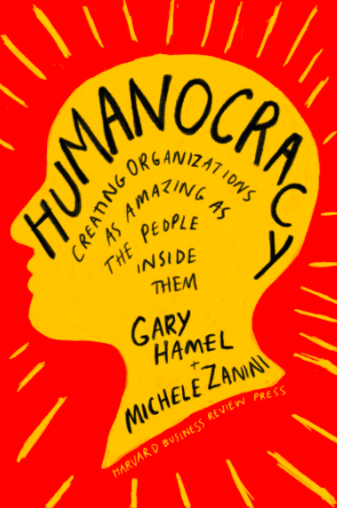In an exclusive interview with CEO Magazine ahead of a three-day digital event for WOBI, Gary Hamel talked about the fallout to the pandemic.
Article by Paul Imison and Pablo Hernández Lodigiani
The 100% digital event with Gary Hamel is January 26, 27 & 28. Book your place here.
Gary Hamel is one of the world’s most influential and iconoclastic business thinkers. Described by Fortune magazine as “the world’s leading expert on business strategy” and by the Financial Times as a “management innovator without peer,” his books have been translated into more than 25 languages. Hamel has been on the faculty of the London Business School for more than 30 years and is a fellow of the Strategic Management Society and of the World Economic Forum.
Hamel’s groundbreaking ideas such as “strategic intent,” “core competence,” “industry revolution,” and “management innovation,” are today part of the management lexicon in business organizations around the globe. Now, with his latest book, Humanocracy: Creating Organizations as Amazing as the People Inside Them, co-authored by Michele Zanini, Hamel is introducing a new concept—why humanocracy, as opposed to bureaucracy, is the future of management structures.
In an exclusive interview with CEO Magazine ahead of a three-day digital event for WOBI that will take place January 26-28, Hamel talked about the principles of humanocracy, the fallout to the COVID-19 pandemic, and more.


Could you begin by explaining a little about the concept of ‘humanocracy’ and how it differs from the more traditional idea of bureaucracy?
The essential difference between bureaucracy and humanocracy is that bureaucracy as a social technology was built to maximize compliance. As Max Weber, the famous German sociologist put it more than one hundred years ago, bureaucracy was designed to maximize imperative control over human beings. And control is a necessary part of any business. Humanocracy, on the other hand, is focused on a radically different view of human beings at work. In the bureaucratic model, institutions hire individuals to produce products and services. Within that mindset, the human being is an instrument. They’re simply a tool that organizations use to produce revenue. And as you might expect, when you treat human beings like instruments they don’t give you their best. Humanocracy turns that around. Humanocracy starts with the assumption that human beings are independent agents and we join institutions to do together what we can’t do alone. Bureaucracy seeks to maximize compliance. Humanocracy seeks to maximize contribution.
Why do you think that bureaucratic structures have endured for so long?
Virtually every organization on the planet still adheres closely to the bureaucratic template. Power correlates with position, human beings are slotted into their roles, managers assign tasks and assess performance, and everybody competes for the scarce resource of promotion. But I think bureaucracy is reaching its performance limit. Like all technologies, it’s a product of its time. Industrial bureaucracy was invented in the late 19th century. At that time, the average employee was illiterate. It was a time when managerial skills were still quite rare. And it was a time when scale rather than innovation and resilience was the most important advantage. All of those realities have changed and yet most organizations are still based fundamentally on that 19th century technology. It seems to me that it’s time to humanize the management model because today we live in a world where the most important advantage for any organization is initiative and creativity. And those human capabilities are systematically squandered by top-down bureaucratic organizations.
“When you treat human beings like instruments they don’t give you their best. Humanocracy turns that around. Humanocracy starts with the assumption that human beings are independent agents and we join institutions to do together what we can’t do alone.”
Do you feel that business organizations today are aware of the importance of capitalizing on their human resources?
I think many CEOs around the world are learning painfully that it’s impossible to compete in a dynamic networked world with a stratified hierarchical organization. Nevertheless, most have not yet made the jump to these new organizational forms. Unfortunately, in many organizations 90% of their innovation efforts go into operating innovations or new products and services. I’ve had the good fortune to work in hundreds of organizations around the world from startups to global giants but certainly among larger organizations you find that they all suffer from similar disabilities. They all struggle with disruptive change. In most large organizations the typical change program is a catchup program. They struggle with game-changing innovation and tend to be quite incremental in the way they think.
How does that hold back the average employee?
Gallup data tells us that around the world only 15% of employees are truly engaged in their work. Today in the US, more than 40% of people are in what we would call low-skilled jobs. And I think that is a complete misnomer. I don’t think there’s any job on the planet that’s inherently low skilled. But you have a lot of jobs that are low opportunity where the people in those jobs don’t have a chance to get training, nobody’s investing in their business thinking or creativity. So you see these organizations that are inertial, incremental, and often inhuman while human beings are resilient, creative, and passionate. Given the challenges we face as a species, from climate change to mass economic migration to pandemics, we need to unleash all the human capacity we can. Change starts with activists, people on the fringes.
Given the speed at which the world is changing, would it be fair to say that a fresh approach is needed if organizations wish to remain competitive in the 21st century?
I think so. Today, every organization whether they want to admit it or not is teetering on the brink of irrelevancy. And to be able to stay ahead or take the lead you have to build an organization that can change as fast as change itself. It’s what I call an organization that has an evolutionary advantage. An organization that changes before it has to and rushes out to meet the future. Bureaucracy was built to enable us to do the same things over and over with ever increasing precision. And that’s still important. This is not an either/or situation. But what I try to lay out in my book is a way of applying the benefits of bureaucracy—the control, the consistency, the coordination—while also stressing the importance of innovation, creativity, and resilience.
Given the ongoing fallout to the COVID-19 pandemic, would you say that business leaders should regard this as a moment of reflection and perhaps an opportunity to try new ideas?
I think the pandemic will give an impetus to the kind of transformation I’m describing. During small crises, power moves to the center of organizations. During larger crises, it moves to the periphery because people at the edge of the organization understand that people at the center are clueless. By definition, when you have a phenomenon like COVID-19, which is both new and very fast-moving, centralized structures fail. They cannot keep up, they cannot respond. What you saw with the pandemic, for example, was networks of people within and across organizations coming together to learn from each other. This happened in healthcare among researchers and physicians. They were not waiting for guidance from the FDA or the CDC, they were just moving ahead and solving the problems at hand.
“I don’t think there’s any job on the planet that’s inherently low skilled. But you have a lot of jobs that are low opportunity where the people in those jobs don’t have a chance to get training, nobody’s investing in their business thinking or creativity.”
I think that is happening with almost every organization during this crisis. A lot of the leaders and CEOs I talk to are actually surprised, amazed even, at how quickly their people respond and how creatively they work in figuring out how to keep their business running, how to take care of customers. Of course, it’s also true that once a crisis has passed power tends to go back to the center because people at the center are quite jealous. But I think this time may be different. I think this crisis was so universal and challenging that CEOs are beginning to see the potential of their own people in such a way that it could be a real wake-up call.
WOBI on Innovation
This 100% digital event led by Gary Hamel, one of the most influential figures in the field of Management, will help unlock the secrets of building an organization that is as daring and creative as the times demand.















